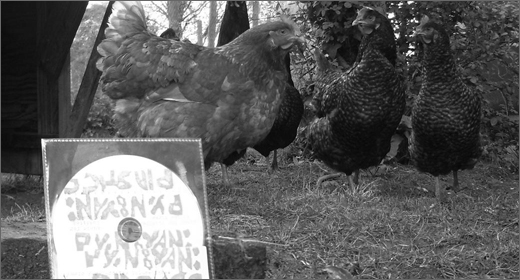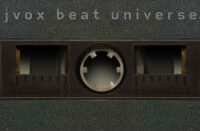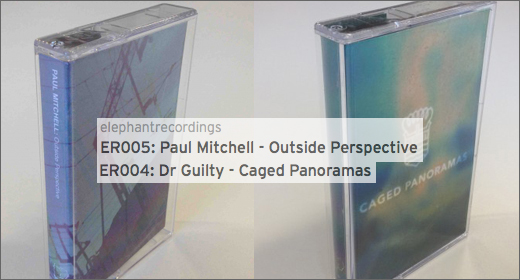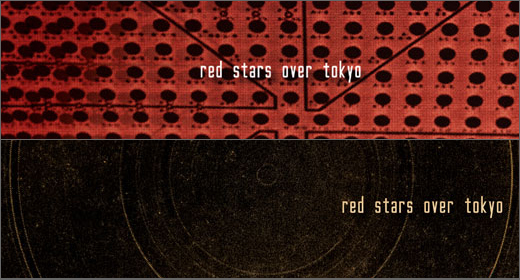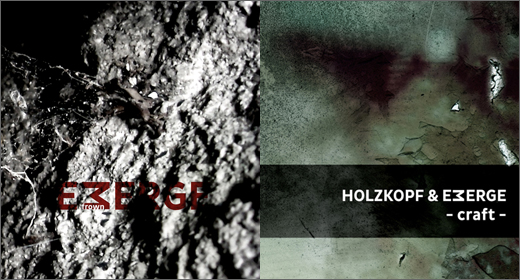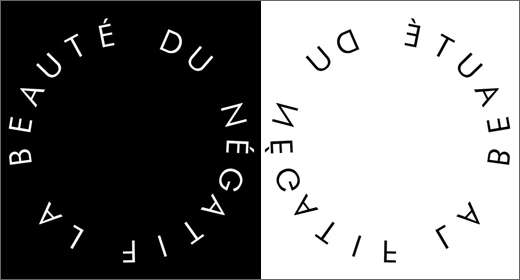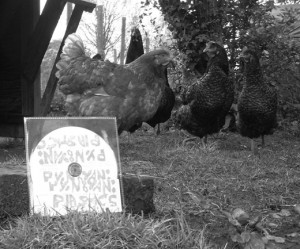
Simon lives in the Hampshire countryside, enjoys car boot sales and cultivating his vegetable garden, and as an artist, is himself a kind of force of nature, bent on nothing but growing, unsentimental, aloof toward the past. He calls himself a “New Luddite” producing “hyperminimal” music. “It takes about an hour to hour to hear [and] about half an hour to make…it never contains more than one idea—sometimes it has none.” Hyperminimalistic music is “clean and non-virtuosic and unsurprising and reliable and relentless,” long-form pieces that “falsely appear never to vary.” Rob Hayler of Radio Free Midwich has described Simon’s method as repetition as basic compositional tool; play, clip, loop and layer and repeat until you’ve made enough. Simon calls this music without quality control and its peak is in its creation—he brazenly fesses up to “hyperinflating music ’till it’s worthless.”
He feels each record should only be listened to once. A New Luddite loathes the past (although he admits that “everything was so much better when it was difficult”) and loves the Internet but only insofar as it facilitates word-of-mouth communication by proxy, being led to new musical adventures by individuals whose taste overlaps your own. You know how to find them, and they will help lead you to “the stuff you adore—the simple stuff, the minimal, the lowest of all ‘fi-s,’ the very quiet, the very loud, the repetitive and the beautiful, the strangers and the outsiders and the unpopular.” Being part of a listening community requires the empathetic capacity to recognize listeners as clever as you are. Because, you know, you are actually clever.
Simon has been constantly recording, working quickly, ”releasing” (a moot term in this context) quickly, not necessarily happy with all the results. When pianist Glenn Gould retired from performing in the sixties, preferring to live a life and enjoy himself in the studio instead, a friend described how, “Glenn now could spend the morning working on a piece, record it in the afternoon, and send it out to his admirers in the evening. I think he would probably have been a blogger and he would definitely have got rid of the record company.” Simon also shares his music and up until recently made only a few CDRs of each piece for associates, but made known on his blog that anyone could have a copy for free if they only dropped him a line. Now, he has taken to releasing his music on Bandcamp, which he “reads” the way other people read the morning paper—he has an uncanny knack for digging up absolute gems and plenty of them, too.
His blog is a goldmine even if only a portion of your personal preferences rubs up against his—which include “tuneful lifeful pop music, stark modern chamber music, harsh noise, relentless minimalism.” Simon did ‘zines before this project first took shape as DDDD (“but of course,” he reminds me, that was way before the Internet “and therefore doesn’t exist”). The ease of access afforded by the computer is as much a set of blinkers and attention-span killer as it is an enemy/helpmeet of memory, depending on. But this doesn’t phase him a bit, in fact he relishes it, because “the slate is always wiped clean.” He wants to work fast, every day, and then forget that day, and think about the next thing.
I wanted in and sent him an e-mail; Simon rolled up his sleeve, rooted around in his archives, and pulled out fistfuls of work representative (or not) of the past year’s production. “The next thing” started with New Luddite Tapes (CDR only of course), some of which Simon still feels are among his best work. I would particularly single out his extended dub techno exercises. New Luddite Tapes #23 was recorded on September 14, 2011 and strings a necklace of hesitant solo piano, the same simple melody, over and over again for seventy-one minutes, the sounding board making its sturdy rim moan woodily, the melody slowly loudening and splintering with oversaturation. The old box survives the onslaught, however, and its peaceful countenance slowly reassembles. It’s kind of magnificent, despite the trick played on it midway through.#43c was made less than a month later, so you get an idea of his work rate. It subjects smooth ambient jetstreams to turbulence, all to the bravely determined beat of a very cheap and cheerful drum machine as a madwoman hums along, rocking in the corner with her knees tucked under her chin. As a sunburst of pop pleasure bursts through the clouds near the end, it turns out she wasn’t so crazy after all, even though she enjoys only a moment of lucidity. Refreshingly cheerful and ear-cleansing. #47 and #48a are each nearly eighty minutes of dub techno soaking wet in reverb, chewing through the landscape, just managing to keep from tripping over its propulsive forward motion. #48b was recorded the same day as #48a (Wednesday, October 19, 2011), is maybe one minute shorter, and has more bounce and spring in its step, but it is also coy, initially fading out regularly, only to return smiling and happy-go-lucky, even getting rough and tumbly and a bit unruly, curling off metal shavings as it goes.
Soon Simon switched to the monicker Pyongyang Plastics. This series ran to 82 volumes (including some double sets) between Monday January 30 and Tuesday May 15, 2012 and are described variously as ”quiet bleak anonymous faster very minimal,” ”bleak fast very very very minimal,” ”very minimal cello and glitches,” ”five long grim Stalinist minimalist luddite tracks” or quite simply ”minimal piano ambient.” Sticking with a strictly numerical system, Pyongyang Plastics #30 is a flower opening its corolla to the morning sun, over and over again, the deep vinyl skips a bumblebee hovering in wait to get at the pollen. The blinking tones of #32 are accompanied by a not-unpleasant scuffing sound that slowly morphs into a soft dub techno canter down a bridal path strewn with pulverized stardust. #45 is quiet, so quiet, it rocks you gently to sleep and then dreams paisley dreams for you. Its disarming grace makes it one of the most profound listens in the discography.

And then Pyongyang Plastics, while continuing to serve as the name of the house imprint, became Yellow Chav, whose albums twenty-nine through thirty-five I have partaken. These are shorter pieces, generally running twenty-five minutes. The first is a village church organ looping lazily against the background of a tin-can carillon. #30 is lightly-treated and understated piano clusters contending with a cocktail bar crowd of muttering, snorting bovines. #31 is a variation on the theme—a quiet, dignified piano piece, at regular intervals giving way to a cello and harmonica interlude, proceeds undeterred by the sound of what turns out to be a swinger’s orgy coming from the apartment next door. It’s a strange juxtaposition, naturally, but interestingly doesn’t feel at all voyeuristic. #32 employs essentially the same piano track now in much closer proximity to a single couple, gentler than the fun-lovin’ partygoers, whose kisses are amplified and gasps echo, although Yellow Chav tweaks the tape at times to make it sound like two animals rutting. #33 burrows deeper between the sheets for an even more intimate lovemaking session, with more audible and explicit pillow talk and a music more retiring, amorphous and ambient. #34 is deeply self-involved piano now seemingly oblivious to the dalliance in the next room, a loop of gasps, approaching orgasms and jarringly, a piece of porcelain knocked over and smashing on the floor—perhaps it is an alternative postulated view of the same session? The last one I listened to, #35, almost tripled the length of its half-hour long companions, while sharing the same sound sources. Obsessive compulsive quirk or a kind of minimalist relativism, reexamining the same phenomenon from different angles to see if a shift in perspective provides new insight? It’s an altogether fascinating way of literally injecting music with sex.
Since you started reading this article, Yellow Chav has been retired as Simon made a ”change of course” and been replaced with Sonja Berlin-Jones, whose work is freely available online. Some twenty-odd, half-hour long pieces featuring colourful, neo-suprematist graphics are being added to regularly on Bandcamp. While several overlapped with the copulatory piano trios mentioned above, others brought sex and love talk into more synthetic environments – electronic bat echolocation in the shower stall on´Routine´ – while ´Simple Risks´ recalls his earlier, dub ambient pieces as New Luddite Tapes but with a lighter, though industrial touch. Some of the latest, like the hyperminimalist Palinka and Screesliding, are deliciously dark. The latter plays a breathy, midnight saxophone loop against an eerie, bubble bubble toil and troubled ambient background (and lost and forlorn cello) and features a sample from the Hungarian film Damnation by Béla Tarr (1988). It’s a moody, Bela Lugosian contrast. Pewter (more Tarr) is left standing alone out on the blasted heath listening to the tolling of church bells from the village, until the landscape is ripped open by a calamitous whirlwind in the final moments. It is part of the singularity of Simon that he will often throw in a dash of noise somewhere, from a dish or vase crashing in another room to a tornado or really bad glitch.
The song may remain the same for a while as Simon turns an idea around, as the transformative process is ongoing, organic and happening right before your ears. From the extended, saturated fat dub techno to the sophisticated Sonja´s circular sax, Simon´s music is a cottage industry producing process. Again, according to the New Luddite credo, each piece is only intended to be listened to once, but I must admit being tempted to return to several of the discs for a second, maybe even third time.
Visit the DDDD Fanzine here.






